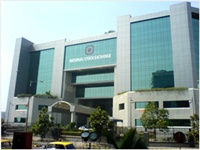NSE emerges top global equity trading platform for the second year in a row
20 Jan 2014
The National Stock Exchange (NSE) retained its position as the world's largest bourse in terms of number of equity trades for the second consecutive year in 2013, while China's Shenzhen Exchange overtook the NYSE as the second largest.
 On the other hand, the Bombay Stock Exchange (BSE), India's oldest and once largest stock exchange, slipped one place to the eighth position.
On the other hand, the Bombay Stock Exchange (BSE), India's oldest and once largest stock exchange, slipped one place to the eighth position.
NSE reported equity trades of around 1.45 billion on its platform last year, a gain of 3 per cent from 2012, making it the biggest among 51 global peers, according to data with the World Federation of Exchanges (WFE).
BSE, which has over 4,000 listed companies in its fold, recorded a turnover of 344.6 million trades last year, a drop of 3 per cent from levels seen in the previous year (2012).
China's Shenzhen Stock Exchange, with annual trades of recorded 1.29 billion, climbing three notches to become the second-largest bourse in the world. The Shenzhen SE, which pushed NYSE Euronext to third place, added 38 per cent to its market cap during the year.
Shanghai Stock Exchange, another Chinese bourse, moved up to the fourth place from sixth in 2012, while the Nasdaq dropped two places to fifth.
Others in the top 10 bracket include Korea Exchange (6th), Japan Exchange Group - Tokyo (7th), Canada's TMX Group (9th) and London SE Group (10th).
The Japan Exchange Group - Tokyo, reported about 600 million trades in 2013, a 71.4 per cent increase from the 2012 level.
The NSE and the BSE saw their combined an equity trade volume rise almost 2 per cent to 1.79 billion in 2013.
Globally, the number of equity trades rose 6.6 per cent to 10.45 billion, while equity trading in the Asia Pacific region witnessed a gain of 13.7 per cent at 6.61 billion.
During the year the stock markets got a boost after the government and the Reserve Bank of India (RBI) took steps to sustain foreign institutional investments in order to sustain economic growth.
Moreover there was an increased flow of funds to the emerging markets with investors looking for alternative opportunities in the aftermath of the financial crisis.
Analysts expect 2014 bringing more opportunities for investors as the economic crisis ends and global recovery starts.
The recent rally on the stock market despite the Fed's announcement of its decision to taper the monetary stimulus programme is sign enough of the revival of the equity markets. Experts believe with the global economic recovery, 2014 would further stimulate stock markets.



















